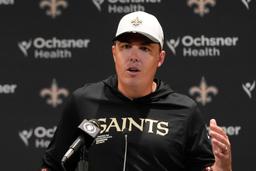Troy Aikman Slams NFL GMs for Overlooking Ashton Jeanty in 2025 NFL Draft
Dallas, TX – August 18, 2025
Dallas Cowboys legend and Pro Football Hall of Fame quarterback Troy Aikman has unleashed a scathing critique of NFL general managers for their baffling decision to pass on Boise State running back Ashton Jeanty in the 2025 NFL Draft. Jeanty, widely regarded as one of the most dynamic talents in college football, slipped to the sixth round before being selected by the Cleveland Browns, a move Aikman called “an embarrassment” for the league’s decision-makers.
“These GMs are looking foolish right now,” Aikman said during an ESPN segment promoting his upcoming documentary. “Ashton Jeanty ran for over 2,600 yards and 29 touchdowns at Boise State—numbers that scream elite talent. How does a kid like that drop to the sixth round? These front offices are going to regret this when their fans are stuck watching subpar backfields.” His fiery remarks echo the frustration felt by many who saw Jeanty as a top-tier prospect.

Aikman, a three-time Super Bowl champion with the Cowboys, knows a thing or two about building a winning roster. His tenure in Dallas was marked by a keen eye for talent, and his latest comments reflect his disbelief at the oversight of Jeanty, who showcased electrifying speed and vision in his preseason debut, rushing for 87 yards and a touchdown. “The Browns got a steal, but even they buried him on the depth chart initially,” Aikman noted. “This kid’s going to make a lot of teams look silly.”
The 2025 draft saw Jeanty overlooked in favor of other running backs, despite his record-breaking college stats and versatility as a pass-catcher. Posts on X have amplified Aikman’s sentiments, with one fan writing, “Jeanty in the sixth round? GMs must’ve been asleep!” Another added, “Cowboys could’ve used him—our backfield needs that spark.” Aikman’s critique points to a broader issue of teams misjudging talent, a mistake he believes will haunt franchises as Jeanty’s star rises.
For Cowboys fans, Aikman’s words carry extra weight, given the team’s own struggles with running back depth. Dallas passed on Jeanty, opting for Omarion Hampton in the first round, a decision that has sparked debate. “When you’ve got a player like Jeanty, you don’t let him slip,” Aikman said. “Fans deserve better than watching teams fumble these picks.”
As the NFL season kicks off, Jeanty’s early performances are proving Aikman right. His blend of power and agility is turning heads, and the GMs who overlooked him may soon face the consequences. Aikman’s passionate defense of Jeanty serves as a reminder of the fine line between draft brilliance and blunder, urging teams to trust the tape over trends.












